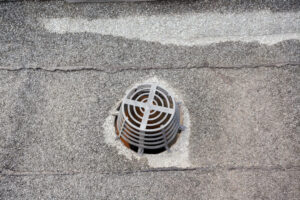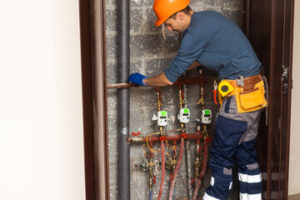Sewer maintenance is crucial for ensuring the proper function of your plumbing and drainage system. Talk to a professional to develop a program that works for you.

In their search for oxygen and moisture, roots will penetrate the tiniest cracks in a sewer line pipe. Calling a plumber before the problem becomes serious is the best way to avoid costly repairs and prevent sewage backups. Visit Website to learn more.
Sewer pipes are designed to take waste away from your home and into the sewer system, where it is transported to the city’s wastewater treatment plant for cleaning and reintroduction into the water supply. They are very important, and it is critical to keep them in good condition. If a crack or break occurs, it can cause extensive damage to your property and threaten your safety and health.
There are several things that can lead to a cracked or broken sewer pipe, including age, ground movement, and improper construction. Over time, metal pipes corrode due to continuous exposure to moisture and harsh chemicals. The resulting corrosion can make the pipes brittle and weak, which in turn leads to cracks. Poor construction, such as pipes being installed too close together or having a back-pitched slope, can also cause cracking.
A common sign of a cracked or damaged sewer line is the appearance of sewage in your yard. This is caused by a clog in the line, which prevents wastewater from flowing through your pipes. You may also notice gurgling in your drains, which is caused by water bubbles inside the pipes. If left untreated, the gurgling will eventually lead to a full-blown sewer backup.
Cracks in the pipe are a serious problem because they can affect how your sewer lines work and can even expose your home to sewage leaks. The most severe cracks can be a complete structural failure that requires immediate open trench or trenchless sewer repair.
Minor fractures in a pipe are not as severe, but they should be inspected every three to five years to determine whether the crack is getting worse. Any crack that exposes aggregate or is causing root intrusions should be considered moderate or severe, and you will need to have the pipe replaced.
There are several options for sewer repair, including cured-in-place pipe lining (CIPP), which involves inserting an epoxy-coated liner into the existing pipe. This option is the most cost-effective and least invasive. Other options include traditional trenching and spin casting. These methods involve digging up your flooring and trenching through the yard, but they can be effective for pipes that have completely failed or are severely leaking.
Tree Roots
Tree roots are one of the most common causes of clogged sewer lines. They grow quickly and can invade and damage your pipes, leading to costly repairs. Luckily, you can prevent this problem by having a professional plumber inspect your line and perform regular root removal services. You can also use products like foaming root killer to prevent the problem before it starts.
Roots often invade sewer lines because they are seeking moisture. They can find this through small leaks in the line, which leave your pipes vulnerable to the moisture and nutrients found inside of them. Once the roots enter the pipe, they can block the flow of sewage and other wastes, which leads to a messy and smelly sewer clog.
When you’re able to identify a problem, it’s important to call a plumber for help right away. They have the skills and equipment necessary to kill the roots and repair your pipe, which will save you a lot of money in the long run. Plus, they’ll know how to handle the situation safely and effectively.
You may be tempted to try and save money by killing the root growth yourself, but it’s not worth the risk. These DIY solutions are often ineffective and can actually cause more damage to your pipes. The best way to protect your sewer line is to plant trees far away from it, and if you must have them close by, be sure to select species with shallow or noninvasive root systems.
Another option is to have a professional use a drain cable machine to chop the root and clear out the line. This is a powerful piece of machinery that consists of a stiff, flexible rodder with a razor-sharp blade that rotates and cuts through the root. You’ll often see this equipment used by plumbers who specialize in clearing and cleaning sewer and drain lines.
Once the roots have been cut, a plumber will flush out the line to make sure no debris is left behind. This will likely take a day or two, but it’s a much better solution than dealing with a costly pipe repair bill down the road.
Faulty Pumps
If your pump is not working properly it can be due to a number of factors. A faulty electrical system can result in the pump shutting off after a few seconds of operation or not starting at all. Using a multimeter and a test light to check the voltage on the wires is helpful. If you find that the wires are corroded, have an electrician replace them. Also, make sure that the pump is plugged into its own circuit breaker and not shared with any other outlets or appliances. Having the pump in direct sunlight can also cause it to overheat.
A rattling noise from the pump is an indication of loose fragments within the pump impeller. This can occur due to wear and tear, excessive stress, or foreign objects being pumped into the pump. It is easy to fix this by replacing the impeller.
If the motor overload breaker keeps tripping, this could be due to overheating or a poor cooling system. Have the pump checked by an electrician and compare the line voltage to its manufacturer’s specifications. Consider changing the receptacle to one that can handle a higher load or by having the power company install an outlet in your pump box so it has its own branch circuit.
Another common reason for a pump to fail is a mechanical seal leakage. This can be caused by a variety of factors, including thermal distortion, misalignment, and inadequate lubrication. A good preventive maintenance program will include a checklist for visual inspections and the use of technical manuals with details such as tolerances and pressures. It will also involve the use of general shop tools and a range of wrenches, sockets, and screwdrivers as well as packing pullers and grease guns.
A seized pump shaft is another common cause of failure. A simple way to check if your pump shaft is seized is to place a small flathead screwdriver into the end of the shaft and attempt to turn it. If it turns easily this is fine, but if you cannot turn the shaft at all then your pump shaft has seized.
Faulty Pipes
Pipes break for several reasons, but minimal or poor maintenance is a major cause. Pipes aren’t designed to be stationary, and if they are not maintained properly, the constant movement of water, ground tremors, or even vibrations from the plumbing system itself can cause them to crack. This damage can lead to leaking, flooding and other serious problems.
Faulty pipes are also more likely if you live in an area that experiences extreme weather. Temperature changes can cause ice to form inside the pipes, and when this ice expands, it puts tremendous pressure on the walls of the pipe, which can make them crack or break. These breaks can also happen if the pipe was installed incorrectly.
Other common causes of faulty pipes are rodents and bugs. Rats and mice love to hide in crawl spaces and attics, where they can chew on piping or create blockages with their waste. Insects can also infest a sewer line, as they seek out food and moisture in the pipes. Rodents and insects can also damage a sewer line by creating holes in the piping, which can allow outside materials to enter and contaminate your home.
Probably the most worrying of all sewer problems is when sewage backs up into your house. This is a sure sign that your sewage line has clogged and you need to call in a plumber. Sewage backflow can create gag-inducing odors, and it can wreak havoc on your plumbing system and the interior of your home.
When it comes to preventing sewage problems, there are many things you can do. Check the piping in your home often, and pay special attention to the connections for washing machines, dishwashers, toilets, and other appliances. Keep an eye out for rust, leaks, corrosion, and other signs of trouble. These steps can help you nip problems in the bud and avoid costly repairs in the future. In addition, consider investing in a professional sewer inspection and cleaning service to ensure that your pipes are working well. Keeping up with these maintenance steps can help your piping last longer and keep your family healthy and happy.
